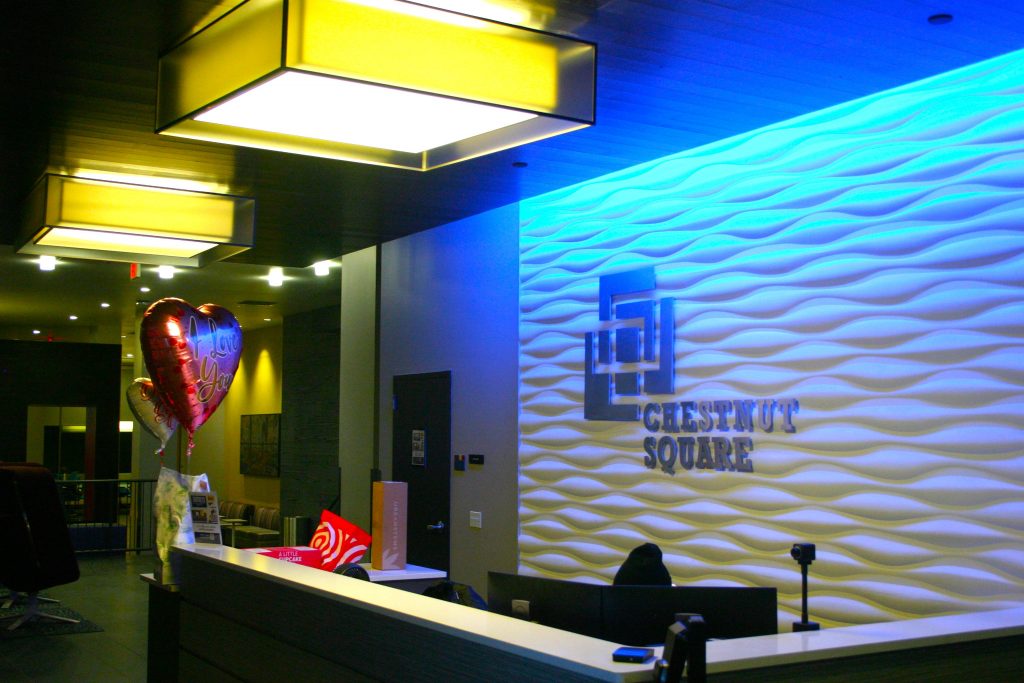
Amidst the rollout of an app-based building key system, residents of two American Campus Communities properties are experiencing difficulties getting into their apartments. ACC is partnered with Drexel University to offer second-year students housing alternatives to a Drexel dormitory that fulfill the university’s Two-Year Residency Program.
Drexel students living in Chestnut Square and The Summit at University City had their key fobs replaced this fall and winter, respectively, by the Livvi mobile app, which is touted as a “Mobile Access solution” that makes physical key cards and fobs redundant. It was developed by Assa Abloy, AB, a Swedish “entrance automation” conglomerate that owns lock brands like Kwikset and Sure-Loc.
The app is seemingly straightforward. Residents can unlock the door simply by opening the app and scanning their mobile device. It uses the same Bluetooth-based technology as a physical key card or fob on existing scanners.
But the first red flag appears before even downloading the app: its App Store rating. At time of writing, it has received 1.1 out of five stars based on 227 reviews. The reviews themselves are tales of woe.
Residents who spoke with the Triangle voiced many of their complaints.
They have experienced a host of software issues: the Livvi app crashing while failing to open or scan; scanning at their door causing Apple Wallet to open instead; elevators being rendered practically unusable by unreliable scanners; and a frustrating lack of action from ACC, all amounting to headaches. While the previous key fobs were not issue-free, sometimes requiring multiple scans to be recognized, complete breakdowns were rare.
Residents are typically confronted with four touch points where they must scan their key: at the building’s front door, at its front desk, in the elevator and at their apartment door. All have become unpredictable points of failure.
“One time, Apple phones updated and it completely broke the Livvi app. Every time you tried to open the app, it crashed immediately, so building staff told everyone to delete the app and reinstall it. After that, the app would open, but then there was the chance that your key wouldn’t be assigned to you again, and you had to call or go to the office to have them assign your key so that you [could] get into your apartment,” recounted Audra Reidy, a second-year computer science major.
“Sometimes, the elevators require us to scan to make them operate, but that’s inconsistent,” said Michael Davis, a second-year computing and security technology student.
“[They] don’t often work well with the mobile keys and I’ve seen people not able to scan their key in time… so the elevator will pick up a person from [a] higher floor and go down to the ground floor. I tried going from 14 to 4… and [was sent] to the ground floor because I couldn’t scan in time,” Davis added.
Even if the app could be relied upon, it still ties residents’ ability to get into their apartments to their phones. Sarah Fiedorek, a fourth-year fashion design and art history student, has had especially aggravating experiences with Livvi.
“Last quarter, my mobile key stopped working. When I realized, it was late, and the office had closed. The security guard… called the on-call staff member, but they just never picked up. My roommate wound up being able to let me in that night.”
“[Another] night, I was up late. It was around finals, so I was out of my apartment getting work done. I assumed all my roommates were asleep, and given the events of [that] night… I didn’t think the on-call staff would be helpful. I wound up sleeping on one of the couches in URBN, because it’s open 24/7,” Fiedorek recalled.
“I was also once locked out of my friend’s apartment because we got evacuated and his phone had died. We had to go back to my place and let his phone charge,” Davis said.
As a stopgap measure, many residents have been given temporary physical key fobs once again.
“It does not make sense,” Owen Hayes, a third-year software engineering major, claimed. “The scanner at the [front] desk doesn’t work, [so] you just have to show them the app. At the elevators, you have to use your key fob… Currently I have three keys from Summit: the mailbox key, my key fob and now on my phone.”
Unfortunately, the temporary key fobs have proven to be the only reliable solution.
“I would be satisfied if we all had a key fob and a mobile key, as the fob could back up the mobile key, but given the choice the fob is far superior,” said an exasperated Davis.
He recalled being stuck in the building office with other residents for upwards of an hour when mobile keys were first being configured, only to be offered back a fob.
“[I]f it ain’t broke, don’t fix it,” concluded Reidy. “Especially when your ‘fix’ is something so finicky that it could leave you locked out or stuck in an elevator.”


